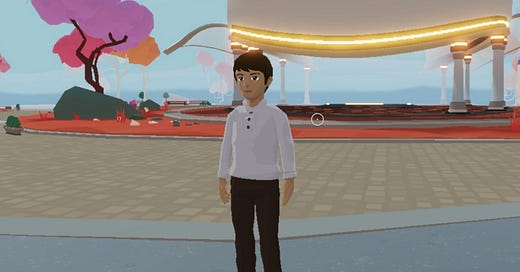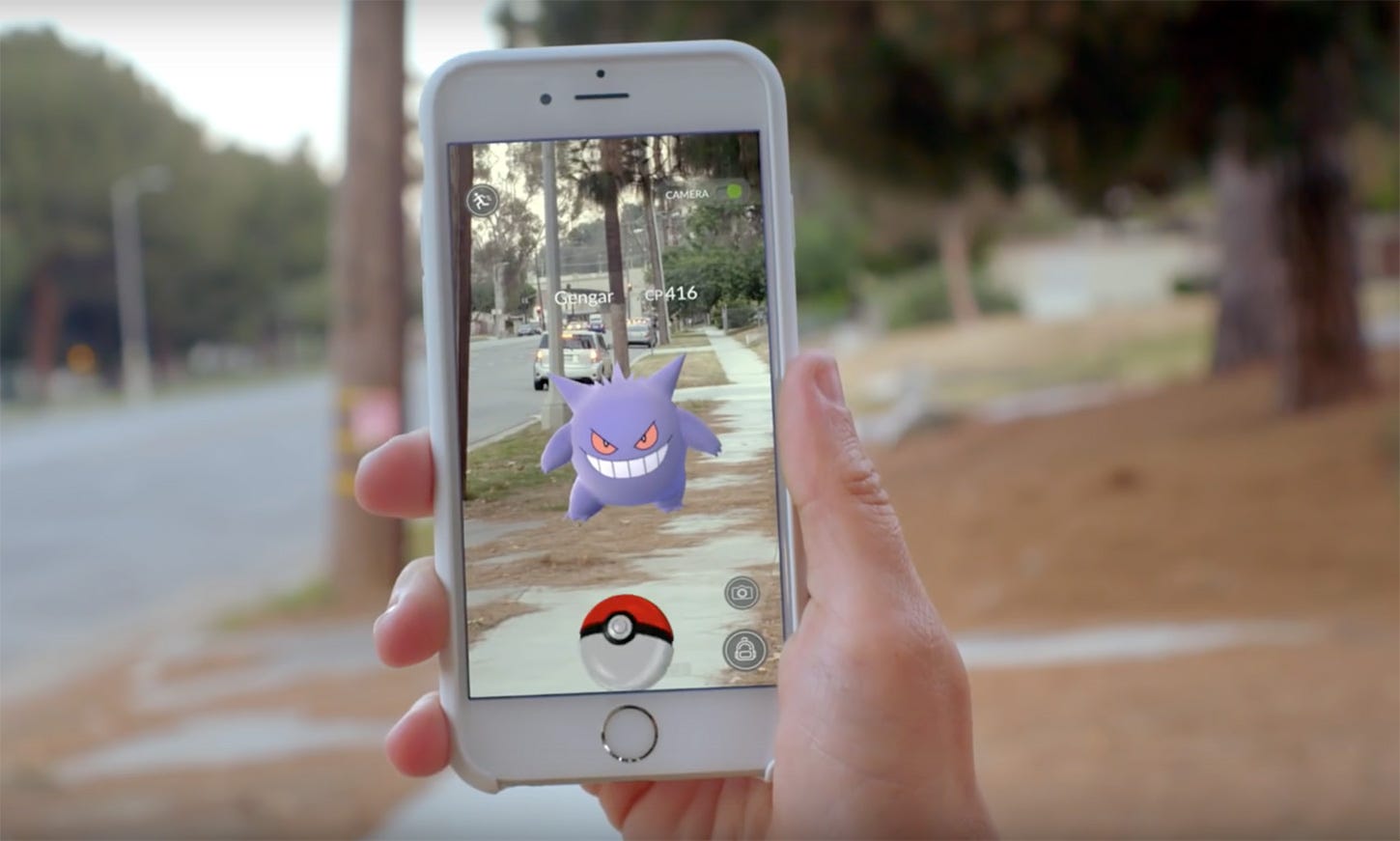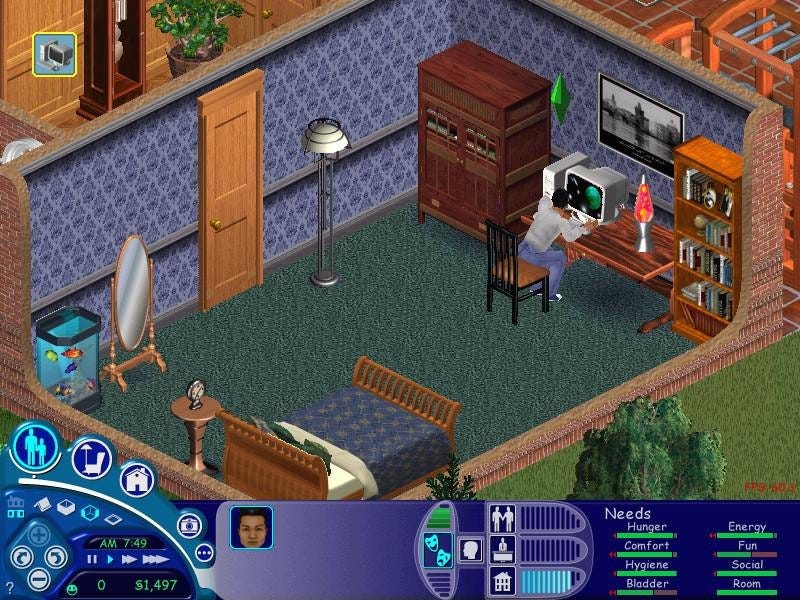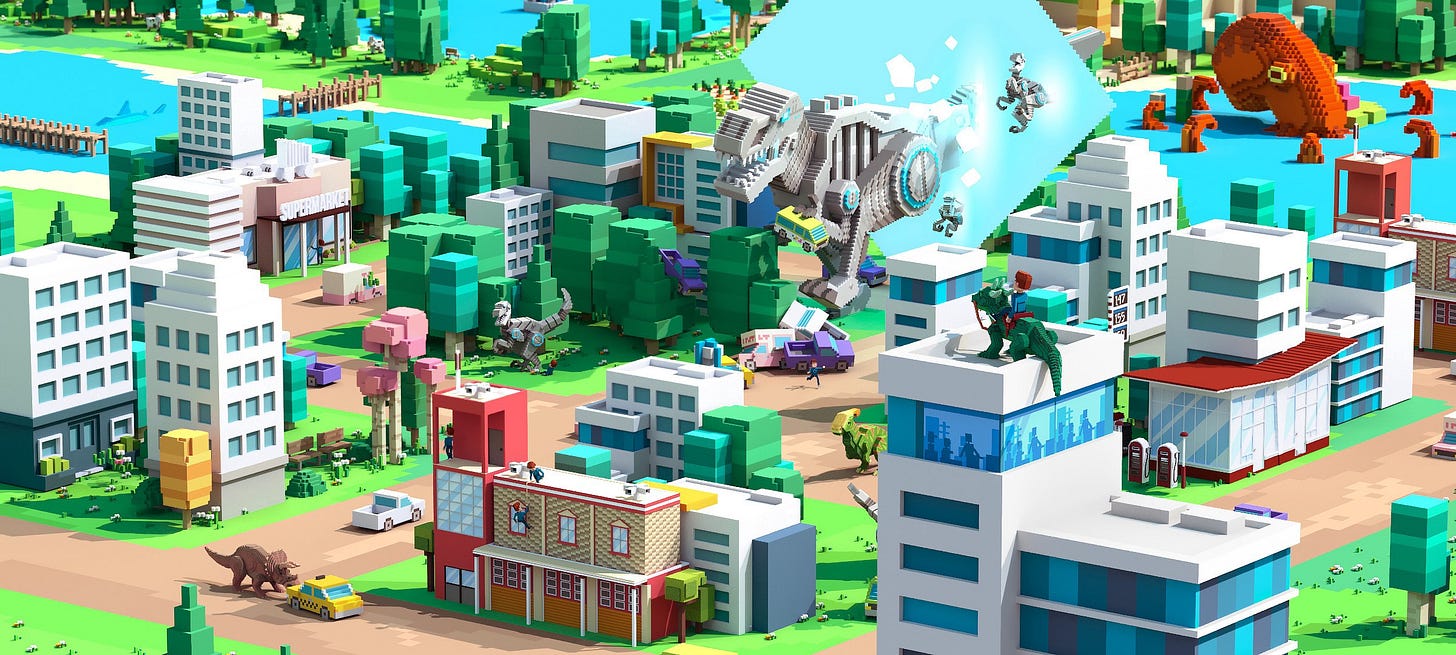Why Should We Care About The Metaverse?
Games like Roblox and Fortnite have brought the concept of the Metaverse into the mainstream - but what does the vision for a Metaverse mean for the future?
I read a phenomenal piece a couple weeks back from my friend Kyla Scanlon on Roblox and the Metaverse. Metaverse was a term I had seen thrown around the internet but had little idea of what it meant for the average person. The piece below is a collaboration with Kyla as we unpacked it together!
If you’re new here, feel free to subscribe and also check out Kyla’s substack here.
Why Should We Care About The Metaverse?
You glance out at the water at a perfectly serene sunset over the Georgetown Waterfront. But as you look to your right, you notice someone else.
They’re fervently tapping their phone. While you may see the image of a peaceful Waterfront, that person sees something else: an opportunity.
This was the reality for millions in the summer of 2016, when Pokemon Go became a viral hit. Waterfronts and forests were suddenly littered with treasure hunters as downloads skyrocketed and random locations became battle hotspots.
While this might initially seem like a silly game, the motivations behind why we play games like Pokemon Go are the building blocks for a much larger thesis - a concept called The Metaverse.
Imagine you could take a world like Pokemon Go… and actually live in it.
Instead of battling other pokemon, you could stare out into the Waterfront and see date ideas. Descriptions of real animals. Potential constellations in the sky.
If you’re imagining some sort of spooky Black Mirror-type reality, that’s still a few years away. But there are many early signs that a more mild reality of this could be something exciting.
You may have heard of games like Roblox and Fortnite, wondering why they’re so popular. You may have seen tech companies jump into new technologies like augmented reality and wondered what the deal was. Google Trends even shows ‘Metaverse’ has been trending upwards in search for 2021.
But it brings up a lot of questions: Why is the Metaverse suddenly so popular? Is there a good reason to be bullish? What does it mean for the way we make our day to day decisions?
To understand the implications for consumers, brands, and our routines - we first have to understand a more first-order question… What the hell is a Metaverse?
What Is The Metaverse?
Metaverse comes from the prefix meta (meaning beyond) and verse, a shortened form of universe. The term refers to the concept of a virtual shared space – in essence, a world where reality could be virtually enhanced.
In a Forbes article discussing Adobe’s inventive approach to the Metaverse, it hints at what’s possible:
“Imagine walking down the street. Suddenly, you think of a product you need. Immediately next to you, a vending machine appears, filled with the product and variations you were thinking of. You stop, pick an item from the vending machine, it’s shipped to your house, and then continue on your way.”
Spooky, right?
Ironically, the origin of the word Metaverse predates much of the internet. It was coined in Neal Stephenson’s 1992 novel Snow Crash, which follows a pizza delivery driver who becomes a warrior prince in an alternate reality known as The Metaverse, simply by wearing goggles that give him a new identity.
But the Metaverse as a concept can be complicated to brand. Is it the same as virtual reality? Mirror worlds? Augmented reality? Spatial internet?
One of the best resources I’ve found is from VC Matthew Ball, who suggests a series of core attributes:
Persistent: It never “pauses” or “ends,” it just continues indefinitely
Open Participation: Everyone can be part of it, no gatekeeping
Value Economy: Sense of “value” or currency has to exist
Duality: Spans both the digital and physical worlds
Interoperability: Allows transfer of assets across worlds (i.e. use a Fortnite gun in another game or create a car in Rocket League to work in Roblox)
Active Contribution: Ability for creators to build and expand the universe
While not all of that is agreed upon, we start to get an idea of what the Metaverse is not.
For example, a simple VR game where you don’t actually interact with any other real people isn’t the Metaverse. Something like Neopets or Sims doesn’t qualify either.
To visualize the Metaverse, a better analogy might be a huge virtual town with a bunch of parties or county fairs. You can walk in and talk to friends, play games, create art, shop. Your identity consistently follows you around as you go to different parties, with each new experience slowly sharpening it.
Roblox, an online gaming and social platform, is perhaps one of the best recently visible examples of this. People of all ages can build virtual worlds in minutes and share those worlds with their friends. It also allows users to get a regular allowance of Robux, the in-game currency that they can use to buy and sell products, as well as customize their avatars.
David Baszucki, one of the co-founders of Roblox, has gone as far as to say even this: “The Metaverse is arguably as big a shift in online communication as the telephone or the internet.”
The vision Baszucki has is not some cryptic Black Mirror-esque reality – in fact, it’s an arguably normal one, predicated on lots of things we’re already doing today with tools like Zoom. If we’re already sick of Zoom baby showers, is there a place to explore gender reveals in the Metaverse?
Understanding it as an extension of the human experience gives us a small primer on why this entire concept gets a lot of people excited. The reasons stem from the possibilities, but also the psychology of games we’ve played forever, even before the days of Pokemon Go.
Games like The Sims.
Why Do People Love the Metaverse?
Growing up, many of us thought intimately about what we wanted out of our first homes. In the Sims, anything was possible. A garden in the back. Paintings across the hallway.
There was a comfort in this virtual world. An element of control. We could dress our Sims in outfits we only dreamed of. We could make our Sims go swimming, socialize with neighbors, grow vegetables. Anything. There was an alluring predictability.
As we discussed above, the Sims isn’t exactly the Metaverse. But a lot of the motivations translate well. Steve McKeown, founder of MindFixes and owner of The McKeown Clinic, argues that simulation environments are one of the best alternatives of escapism.
“The Sims can allow a person to escape social normality, its pressures and chronic stresses that are so prevalent in the real world, it allows the gamer to create a perfect reality in which they play the main character and have full control over the outcome.”
In a way, the thesis for the Metaverse is social rebellion. You’re not bound by rules. There’s no cultural or social norms in the Sims. Trap someone in a swimming pool if you want. Walk into people’s houses unannounced. You can live vicariously through the unencumbered lives of your virtual avatars.
But the vision doesn’t end at gaming platforms – that’s just the beginning.
We heard from Roblox founder David Baszucki above. In the same piece for Wired, he shares:
“Gaming platforms are being used to host meetings ranging from online birthday parties to job interviews. While gaming has initially been the province of such digital co-experiences, it is rapidly expanding. People will meet in virtual worlds not just to play a game, but also to check out a new movie trailer or laugh at user-generated videos.”
Could we have a Roblox type game for Zoom birthday parties? For regular hangouts? An experience specifically for concerts?
One recent example of this is from Fortnite, who threw a virtual Travis Scott concert that saw the rapper performing Sicko Mode emerging from a crashed asteroid and then going from underwater to outer space. It was not only a visual marvel, but it pushed the limits on what concerts could look like for artists who no longer have to succumb to basic physics.
The use cases are limitless – and they explain why every tech giant is excited about the Metaverse.
Adobe is already dreaming of integrating AR into your life with Adobe Aero. Facebook has begun to expedite development on its own Facebook Horizon experience, a VR social platform. Even Apple has made a major push into the space with RealityKit, ARKit and Reality Composter, with some even forecasting goggles coming by 2022.
There is even a core motivation around creation. As games like Roblox get popular, everyone has the capacity and power to be a creator. It’s agnostic of age and background. In worlds that are effectively powered by contribution, any single participant has intrinsic value.
But not all that glitters is gold – as we discussed, one of the core tenets of the Metaverse is decentralization. Allowing data and assets to be transferred across systems. This is where it becomes hard for a big tech company to compete. To believe in the Metaverse, one would effectively have to believe in ceding control.
Take Apple for example. The company is currently in a heated battle with Epic Games over a dispute that stemmed when Apple kicked Epic off the App Store for offering its own currency within the Fortnite app. Tim Sweeney darkly commented: “In Apple’s view, only the Apple metaverse would be allowed.”
Apple knows the game of incentives very well. By outlawing these games, they ensure that competition remains minimal – either giving them time to develop their own hardware, or enough time to block a larger movement from happening.
If Apple believes in technologies like AR, why would Apple want to block the Metaverse?
In short, because it transcends how we normally think about communicating.
Apple’s core business is phones. The Metaverse won’t require a phone. Apple is a company that relies on a centralized ecosystem, and the Metaverse is inherently decentralized. In short, the Metaverse presents the company with a major threat of disruption.
But it begs the question: Despite some successes from games like Fortnite and Roblox, does the Metaverse still have broader appeal beyond niche tech circles?
Where Is the Metaverse Headed?
Beyond just creating Avatars and participating in battle royales, there’s a common thread that ties the promising developments of the Metaverse: virtual commerce.
Sandbox and Decentraland, two games based on Ethereum, allow players to spend tokens, create accessories and even buy virtual land. Yes, the virtual land real estate boom is happening!
Rather than investing in physical real estate, investors are opting for the novel promise of digital land. Leading crowdfunding platform Republic is launching a fund specifically for virtual real estate deals with Janine Yorio, Head of Republic Real Estate, making her own bold proclamation: "Buying land today in virtual worlds may end up feeling a lot like buying land in Manhattan in the 1750s.”
Sure, it’s strange - but while the implications it has for how we interact with the world around us are far-reaching and abstract right now, but here are some tangible benefits that we think might come to fruition in the next 10 years:
Education: Rather than every kid sitting in a lecture hall learning the same way from the same professor, we can have immersive, interactive learning experiences. Kids learning from the mode they feel most comfortable in.
Social: Rather than physical barriers, we can have closer interactions. We could be “sitting” in the same room as we write this piece together, rather than a 5-hour car ride apart! That’s powerful for collaboration and connection, and will remove friction from idea generation and execution.
Experiences: If Travis Scott is any indication, virtual experiences can leverage larger audiences and transcendent physics to create the next generation of entertainment. Concerts are one example - imagine broadway shows and open mics as well!
Commerce: Imagine going to a virtual mall within Decentraland to try on a pair of virtual shoes and some jeans, then ordering real ones to be sent to your home. Imagine being a brand that can crowdsource new ideas from creators within the Metaverse. The fact that many of these worlds also have their own currency means value can be generated in many ways – even real money isn’t a detriment to increasing your worth within a Metaverse.
Does all of this sound too good to be true? Not promising at all? What’s stopping it from happening?
Final Thoughts
Despite what you’ve read, there are still lots of barriers to us seeing rapid adoption of the Metaverse tomorrow.
For one, the barrier of entry is still high. To make the most of a tool like Roblox, you can buy a builder subscription to get Robux but this still means that involvement in the Metaverse comes at a financial cost.
The barrier is not only economical – there is also the technical barrier of participation. To use a tool like Decentraland for example, you need a Metamask wallet. Once you download that and get dropped into the Decentraland universe, you’re told how to move... and that’s basically it. I chose birkenstocks on my avatar by accident and don’t even know how to remove them.
While developers can participate in these ecosystems, they still exist within a niche area of creator monetization, not as readily available as Substack, Patreon or even Twitter for the average creator.
There’s the computing power and energy needed to keep a Metaverse alive, with issues around the scalability of the Ethereum platform and the electrical consumption it requires.
Finally, there’s the social apprehension.
Do people want to live in a world that is part driven by virtual components? Could it lead to a sense of delusion? A state of psychosis? We’ve seen some of the worst technology has to offer with shows like Black Mirror – are we doomed to repeat such things?
At some level, it does make sense to think about how the big tech platforms can take advantage of the Metaverse since that may be the best chance for mainstream access – lots of us have Facebook and Apple devices that can plug into where that world wants to go.
But I, for one, am bearish. I think we’ll need a lot more practical applications to take off before we can see the Metaverse as a routine future.
Kyla is slightly more optimistic – in her piece on Roblox and the Creator Economy, she confidently proclaims: “Roblox is a call option not only on the metaverse, but the open-source economy.”
In that same piece, Kyla alludes to the assets of the Metaverse being powerful tools for monetization - almost 1mn developers have earned something on Roblox with earnings > $200mn for 2020. The future of Sandbox and Decentraland as the first iterations in this path to the actual Metaverse.
But Kyla’s bet is less on technology and more on humanity: that the Metaverse will unlock creativity, opportunity, and move us into the next phase of society.
Let’s hope for my sake it happens sooner than later.
I can’t stay in these Birkenstocks for long.









Makes me think of Balaji’s comments on Cloud Cities (see: https://podcastnotes.org/paradox-podcast/balaji-srinivasan-on-the-paradox-podcast/)